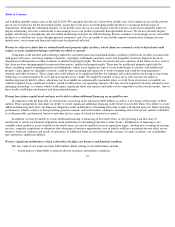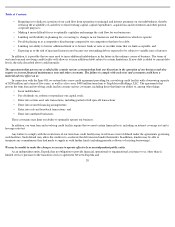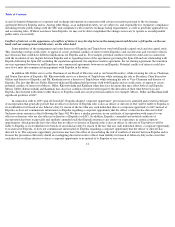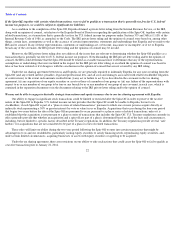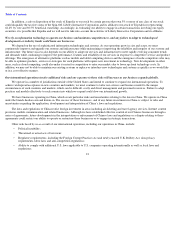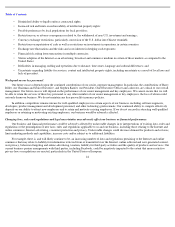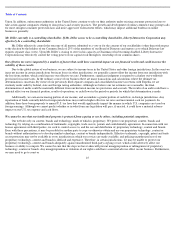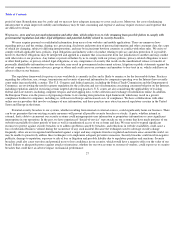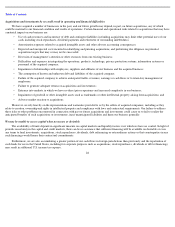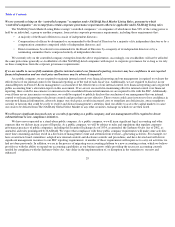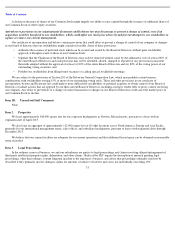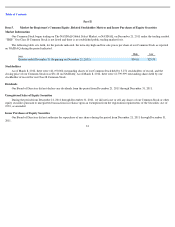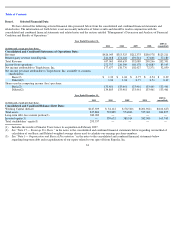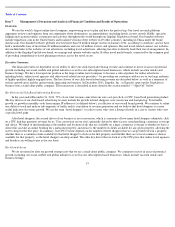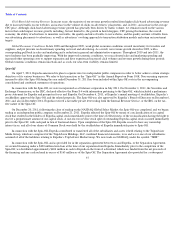TripAdvisor 2011 Annual Report Download - page 33
Download and view the complete annual report
Please find page 33 of the 2011 TripAdvisor annual report below. You can navigate through the pages in the report by either clicking on the pages listed below, or by using the keyword search tool below to find specific information within the annual report.
Table of Contents
We are currently relying on the “controlled company” exemption under NASDAQ Stock Market Listing Rules, pursuant to which
“controlled companies” are exempt from certain corporate governance requirements otherwise applicable under NASDAQ listing rules.
The NASDAQ Stock Market Listing Rules exempt “controlled companies,” or companies of which more than 50% of the voting power is
held by an individual, a group or another company, from certain corporate governance requirements, including those requirements that:
We currently rely on the controlled company exemption from the above requirements. Accordingly, our stockholders will not be afforded
the same protections generally as stockholders of other NASDAQ-listed companies with respect to corporate governance for so long as we rely
on these exemptions from the corporate governance requirements.
If we are unable to successfully maintain effective internal control over financial reporting, investors may lose confidence in our reported
financial information and our stock price and business may be adversely impacted.
As a public company, we are required to maintain internal control over financial reporting and our management is required to evaluate the
effectiveness of our internal control over financial reporting as of the end of each fiscal year. Additionally, we are required to disclose in our
Annual Reports on Form 10-K our management’
s assessment of the effectiveness of our internal control over financial reporting and a registered
public accounting firm’s attestation report on this assessment. If we are not successful in maintaining effective internal control over financial
reporting, there could be inaccuracies or omissions in the consolidated financial information we are required to file with the SEC. Additionally,
even if there are no inaccuracies or omissions, we could be required to publicly disclose the conclusion of our management that our internal
control over financial reporting or disclosure controls and procedures are not effective. These events could cause investors to lose confidence in
our reported financial information, adversely impact our stock price, result in increased costs to remediate any deficiencies, attract regulatory
scrutiny or lawsuits that could be costly to resolve and distract management’s attention, limit our ability to access the capital markets or cause
our stock to be delisted from The NASDAQ Global Select Market or any other securities exchange on which we are then listed.
We will incur significant increased costs as a result of operating as a public company, and our management will be required to devote
substantial time to new compliance initiatives.
We have never operated as a stand-alone public company. As a public company, we will incur significant legal, accounting and other
expenses that we did not incur as part of Expedia. As a public company, we will be subject to rules and regulations that regulate corporate
governance practices of public companies, including the Securities Exchange Act of 1934, as amended, the Sarbanes-Oxley Act of 2002, as
amended, and rules promulgated by NASDAQ. We expect that compliance with these public company requirements will make some activities
more time consuming and may result in a diversion of management’s time and attention from revenue—generating activities. For example, we
have created new board committees, adopted new internal controls and disclosure controls and procedures, and have devoted and will devote
significant management resources to our SEC reporting requirements. A number of those requirements will require us to carry out activities we
had not done previously. In addition, we are in the process of migrating our accounting platform to a new accounting system, which we believe
provides us with the ability to expand our accounting capabilities as our business grows while providing the necessary accounting controls
needed for compliance with the Sarbanes-Oxley Act. Any delay in the implementation of, or disruption in the transition to, our new and
enhanced
29
•
A majority of the Board of Directors consist of independent directors;
•
Compensation of officers be determined or recommended to the Board of Directors by a majority of its independent directors or by a
compensation committee comprised solely of independent directors; and
•
Director nominees be selected or recommended to the Board of Directors by a majority of its independent directors or by a
nominating committee that is composed entirely of independent directors.


